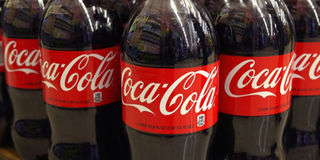Coca-Cola Company fights court ruling on soda bottles

Bottles of Coca-Cola soda are offered for sale at a grocery store on April 17, 2012 in Chicago, Illinois. Nairobi Bottlers has appealed against a High Court decision ordering Coca-Cola Company to put nutritional information and customer care details on its glass bottles. PHOTO| AFP
What you need to know:
- Justice Joseph Onguto argued that all consumers are entitled to the information on the labels, so there was no justification for not having it on Coca-Cola’s glass bottles.
Mr Ndung’u told the High Court that the relevant nutritional information was critical to consumers because it would help them adopt healthy drinking habits.
Nairobi Bottlers has appealed against a High Court decision ordering Coca-Cola Company to put nutritional information and customer care details on its glass bottles within six months.
The company wants the January 30 judgment, which was delivered by Justice Joseph Onguto — who has since died — set aside in its entirety.
“The learned judge misdirected himself in law and fact by creating a category of discrimination based on information provided to the consumer, contrary to the provisions of the Constitution,” the firm said.
It further argued that it was not for the judge to decide whether Coca-Cola Company gives preferential treatment to the consumers of their drinks in plastic bottles while denying the same to those who buy drinks in glass bottles.
PLASTIC
The firm reasoned that when drinks are available in both plastic and glass bottles, it is up to the consumer to choose. It also argued that the judge wrongly interpreted the right to equality, and also failed to take into consideration the principle that not every differentiation amounts to unfair discrimination.
The dispute was first taken to the High Court in 2015 by a Mr Mark Ndumia Ndung’u, who accused Coca-Cola company, together with Nairobi Bottlers, of discriminating against their consumers of drinks in glass bottles since they do not have nutritional information, the company’s e-mail address, and storage directions like the drinks in plastic bottles do.
Mr Ndung’u told the High Court that the relevant nutritional information was critical to consumers because it would help them adopt healthy drinking habits, which is critical if they are to avoid lifestyle diseases such as obesity.
GLASS BOTTLES
He argued that all consumers are entitled to the information on the labels, so there was no justification for not having it on Coca-Cola’s glass bottles.
He argued that while the plastic and glass bottles are the same size, which means it is possible to provide the relevant information on both, Coca-Cola uses the space on its glass bottles to print its name in big print.
While Justice Onguto ruled that the the exclusion of the information amounted to discrimination, Nairobi Bottlers wants the case dismissed, with Ndung’u bearing the costs.





